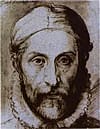Giuseppe Arcimboldo
(1527-1593)
One of the most bizarre and
distinctive painters in the whole of art history, Giuseppe
Arcimboldo (1527-1593) owes his reputation to the series of
composite portraits of heads made up of a variety of objects, both
natural and man-made. Most of these paintings were created at the
court of Rudolf II, who hired Arcimboldo as his court painter,
placing him at the centre of Rudolf's eccentric menagerie of
artists, scientists and charlatans.
Giuseppe Arcimboldo was born in
Milan in 1527 into a highly distinguished family, which boasted
archbishops (including his grandfather), jurists and artists
(including his father Biagio). Little is known about his early life,
but his connections with Milanese nobility undoubtedly helped him
secure work designing frescoes and windows for the cathedral. In
1562 he traveled across the Alps to Vienna to become the portraitist
and copyist to the Hapsburg court, at the invitation of Emperor
Maximilian II (his talent having been noted by Maximilian's father
Ferdinand I, who employed him as a painter of conventional
portraits). Under Maximilian's patronage he produced his first
series of the Seasons and the Elements, which were formally
presented to the Emperor on New Year's Day, 1569.
 In
1570 Arcimboldo was sent to Prague, to design an elaborate pageant
for Maximilian that blended classical and Czech mythology, and he
was to perform similar duties for Maximilian's son Rudolf II, when
he ascended the Hapsburg throne in 1575. Arcimboldo designed the
festivities for Rudolf's coronation and other state events, while
spending his spare time devising hydraulic machines and new forms of
musical notation using colors. In
1570 Arcimboldo was sent to Prague, to design an elaborate pageant
for Maximilian that blended classical and Czech mythology, and he
was to perform similar duties for Maximilian's son Rudolf II, when
he ascended the Hapsburg throne in 1575. Arcimboldo designed the
festivities for Rudolf's coronation and other state events, while
spending his spare time devising hydraulic machines and new forms of
musical notation using colors.
In 1591 he produced his
masterpiece, Vertumnus, an allegorical portrait of his master Rudolf
II as the Roman god of metamorphoses in nature and life, with
Rudolf's face made up of fruit and flowers, symbolising the perfect
balance between nature and harmony that his reign allegedly
represented. Arcimboldo died in 1593.
Source:
http://www.abcgallery.com/A/arcimboldo/arcimboldo.html
Other links:
http://www.illumin.co.uk/svank/biog/arcim/arcidx.html |